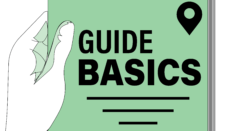Have you ever had doubts while you were writing whether you should put there with B or with V? Many people have this problem and not only with this word, but with others with Hay, ay or ahí. In the case that concerns us at this moment, the difficulty lies mainly in the pronunciation. In the past, B and V were pronounced differently, so it was easy to know when we used one and when another. Unfortunately, over the years, this pronunciation has been lost, as is the case with words that use LL or Y, such as support or cry.

Luckily there is a very simple way to put an end to this mistake and not misspell this word again. Do you want to know what it is? In that case, be sure to read the following post.
What do you need to write there was or huvo?
To know if it is written there was or there was we will need:
- It is very simple, you just need to read the following post and not forget it. You will see how from now on you will not fail again when writing it.
Instructions to write there was or huvo
Step by step to know if it is written there was or there was:
- Let’s see, the first thing we have to ask ourselves is where this word comes from. Forget how it is spelled and just think about where it comes from when you go to use it. Give yourself a few minutes and answer yourself.
- Indeed!, there was comes from the verb to have, in fact it is the third person singular of the simple past tense of this verb. Now, let’s think again, how do you spell haber? Yes, indeed, with B. What does this mean? That we only need to conjugate the verb taking into account the root of this word, and its root is made up of HAB, therefore, HUBO has to be written with B.
- Let’s see some real examples so that we don’t forget. It is easier to retain an idea when one is able to see it once it has been assimilated. Here are some samples of this third person:
- There was an accident at the office.
- On one occasion there was a person who decided to do things correctly.
- One last note. If you look for the word huvo in the Dictionary of the Royal Spanish Academy or RAE, you can verify for yourself that it is not registered, since it is a misspelling and does not have any meaning.
Tips for writing there was or there was
One last tip to know if you write there was or there was:
The best we can offer you is a review of the verb to have and its different forms, both simple and compound, to help you eliminate once and for all this spelling error from your writing.
Simple shapes
Indicative
Present
- I have
- You have
- He has
- He there is
- We have
- You have
- They have
Imperfect tense
- I had
- You had
- He had
- We had
- You had
- They had
Future
- (I) will have
- (you) there will be
- (he) will be
- (we) will have
- (you) will have
- (they) will have
Conditional
- (I) would
- (you) would have
- (he) would have
- (we) would have
- (you) would have
- (they) would have
Past perfect simple
- (I) had
- (you) had
- (he) there was
- (we) had
- (you) had
- (they) had
Subjunctive
- Present
- (I had
- (you) have
- (he) be
- (we) have
- (you) have
- (they) have
Imperfect tense
- (I) would/would have
- (you) would/would have
- (he) would/would have
- (we) would/would have
- (you) would/would have
- (they) would/would have
Future
- (I) would have
- (you) would have
- (he) would have
- (we) would have
- (you) would have
- (they) would have
Imperative
- I have (you)
- haya (he, you)
- let’s (we)
- have (you)
- have (they, you)
Infinitive
- To have
Gerund
- Having
Passive participle
- There have been
Compound shapes
Indicative
Past Perfect Compound
- (I) have been
- (you) have been
- (he) has been
- (he) there have been
- (we) have been
- (you) have been
- (they) have been
Past tense pluperfect
- (I) had been
- (you) had been
- (he) had been
- (we) had been
- (you) had been
- (they) had been
Past perfect
- (I) have been
- (you) had been
- (he) had been
- (we) had been
- (you) had been
- (they) had been
Perfect future
- (I) will have been
- (you) will have been
- (he) will have been
- (we) will have been
- (you) will have been
- (they) will have been
Perfect conditional
- (I) would have been
- (you) would have had
- (he) would have had
- (we) would have been
- (you) would have had
- (they) would have had
Subjunctive
Past tense pluperfect
- (I) would/had been
- (you) would/had been
- (he) would/had been
- (we) would have/had been
- (you) would have/had been
- (they) would have/had been
Perfect future
- (I) would have been
- (you) would have been
- (he) would have been
- (we) would have been
- (you) would have been
- (they) would have been
Compound infinitive
- Have been
Compound gerund
- Having been
